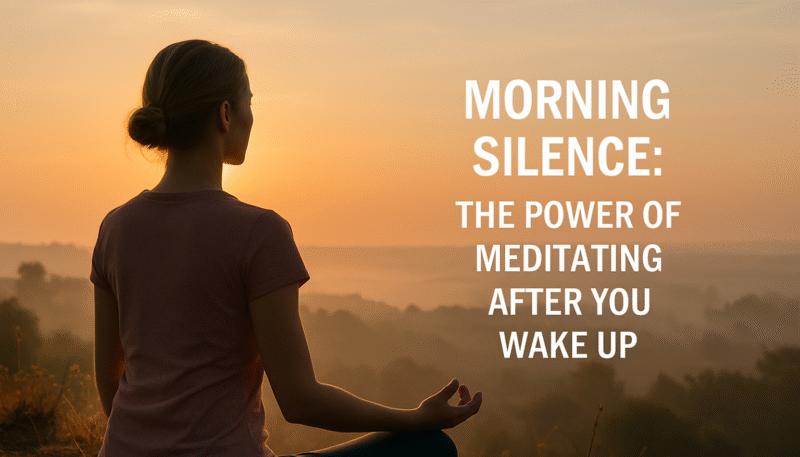Warning: Cannot modify header information - headers already sent in /home/u278635817/domains/mymorninglife.com/public_html/wp-content/plugins/artigosgpt/artigosgpt.php on line 29509
Warning: Cannot modify header information - headers already sent in /home/u278635817/domains/mymorninglife.com/public_html/wp-content/plugins/artigosgpt/artigosgpt.php on line 29509
Imagine waking up to a moment untouched by notifications, errands, or mental clutter—a rare stretch of pure silence. This quiet pause after you open your eyes offers more than calm; it holds the power to transform your entire day. Silence is not just the absence of noise but a gateway to focus, clarity, and emotional balance.
In today’s fast-paced world, the constant barrage of sounds and distractions can overwhelm your mind before your day even begins. Embracing silence first thing in the morning is a simple yet powerful practice that resets your mental state, reduces stress, and primes your brain for peak performance.
In this article, you’ll discover how integrating silence through morning meditation can reshape your mindset, enhance your health, and unlock a deeper connection to yourself and the world around you.
Contents
ToggleThe Science Behind Silence and the Brain
How Silence Calms Neural Activity
Silence reduces the brain’s cortisol levels, the hormone linked to stress. When the mind experiences silence, neural pathways associated with anxiety and distraction quiet down, allowing for mental rest.
This calming effect improves memory retention and decision-making, creating a foundation for clearer thinking throughout the day.
Boosting Creativity with Quiet Moments
Silence creates space for spontaneous insights and creative problem-solving. Without the noise, your brain can connect ideas more freely, enhancing innovation and mental flexibility.
Regular silent intervals during morning meditation foster a fertile ground for imagination and fresh perspectives.
Strengthening Emotional Resilience
Morning silence helps regulate emotional responses by activating the parasympathetic nervous system. This reduces reactivity and promotes a calmer mood.
Over time, practicing silence builds resilience, making it easier to face daily challenges with patience and composure.
Morning Silence as a Ritual
Creating a Quiet Space
Designate a peaceful corner at home free from digital devices and distractions. This sanctuary helps your mind associate the space with calm and presence.
Use soft lighting or natural sunlight to enhance the serene atmosphere.
Timing Your Silence
Start with 5 to 10 minutes immediately after waking up. Gradually increase as your practice deepens.
Consistency is key; morning silence becomes more effective when it’s a daily habit rather than an occasional practice.
Incorporating Breath and Awareness
Focus on your breath to anchor yourself in the present moment. Simple breathing techniques enhance the benefits of silence by calming the nervous system.
Awareness of bodily sensations and thoughts helps you observe without judgment, deepening your connection to silence.
Physical Benefits of Embracing Silence
Lowering Blood Pressure
Studies show that silent meditation can reduce blood pressure by promoting relaxation and improving heart rate variability.
This cardiovascular benefit supports long-term health and reduces risks associated with stress.
Improved Sleep Quality
Starting your day in silence can recalibrate your circadian rhythm, leading to better sleep patterns at night.
Silence helps balance hormones like melatonin and cortisol, essential for restorative rest.
Enhancing Immune Function
Silence reduces inflammation markers and boosts immune cell activity, fortifying your body’s defenses.
Regular silent meditation strengthens your resilience against illnesses over time.
How Silence Enhances Mental Clarity and Focus
Clearing Mental Clutter
Silence acts as a reset button, clearing distracting thoughts and worries that cloud judgment.
This mental decluttering creates space for sharper focus and intentional thinking.
Increasing Attention Span
Engaging in silent meditation trains your brain to sustain attention longer, improving productivity and learning capacity.
Improved focus also enhances emotional regulation and reduces impulsivity.
Facilitating Mindful Decision-Making
Silence allows you to pause before reacting, fostering thoughtful choices rather than impulsive responses.
This mindful approach leads to better outcomes both personally and professionally.
Integrating Silence into Daily Life Beyond Mornings
Micro-Moments of Quiet
Take brief silent breaks throughout your day—during commutes, before meetings, or in nature.
These pauses help sustain calmness and prevent overwhelm.
Using Silence to Improve Communication
Silence during conversations encourages deeper listening and more meaningful connections.
It also provides space for reflection before responding.
Digital Detox and Silence
Limit screen time to reduce noise pollution in your mind. Digital silence supports mental clarity and emotional balance.
Unplugging regularly enhances your ability to enjoy solitude and presence.
Step-by-Step Guide to Starting Your Morning Silence Practice
- Find a quiet, comfortable spot free from interruptions.
- Set a timer for 5–10 minutes to avoid clock-watching.
- Close your eyes and focus on your natural breath.
- When thoughts arise, gently return your attention to your breath.
- End your session slowly, opening your eyes with gratitude.
Common Challenges and How to Overcome Them
Restlessness and Wandering Mind
It’s normal for your thoughts to drift. Don’t judge yourself—just gently bring focus back to your breath or the silence.
Over time, your concentration will strengthen, making silence easier to sustain.
Time Constraints
Even a few minutes of silence can be impactful. Prioritize quality over quantity and build up gradually.
Integrate silent moments into existing routines, like right after brushing your teeth.
Discomfort with Silence
Silence can feel unfamiliar or even unsettling at first. Use guided meditations or soft ambient sounds if needed.
Allow yourself to explore silence as a form of self-care rather than a task.
Measuring the Impact of Silence on Your Well-Being
| Benefit | Expected Outcome | Timeframe |
|---|---|---|
| Reduced Stress | Lower cortisol levels, calmer mind | Within 1 week |
| Improved Focus | Longer attention span, better decision-making | 2–4 weeks |
| Enhanced Sleep | Deeper, more restful sleep cycles | 3–6 weeks |
| Emotional Balance | Greater resilience and patience | 4–8 weeks |
Conclusion
Choosing silence as the first sound you embrace each day is a transformative act of self-care. It calms your nervous system, sharpens your mind, and opens a pathway to deeper emotional well-being. By welcoming silence into your mornings, you set a tone of clarity and presence that ripples through everything you do. In a noisy world, silence becomes your superpower—quiet yet profoundly powerful.
FAQ
What is the best time to practice morning silence?
The ideal time is immediately after waking up, before engaging with any distractions like phones or conversations. This timing allows your mind to start fresh and calm, setting a peaceful tone for the day.
How long should I meditate in silence each morning?
Begin with 5 to 10 minutes to build the habit without feeling overwhelmed. As your comfort grows, gradually increase the duration to 20 minutes or more for deeper benefits.
Can silence help reduce anxiety?
Yes, regular exposure to silence lowers stress hormones and activates the parasympathetic nervous system, which reduces anxiety and promotes relaxation over time.
What if I find complete silence uncomfortable?
It’s common to feel uneasy at first. Try adding gentle ambient sounds or guided meditations to ease into the practice. The goal is to build comfort with quiet gradually.
How does silence improve focus?
Silence minimizes distractions and mental noise, allowing the brain to concentrate better. This enhances attention span, memory, and decision-making skills, especially when practiced consistently.
For further reading, explore resources from National Institutes of Health and Mindful.org.
More Articles















Sponsored Content













